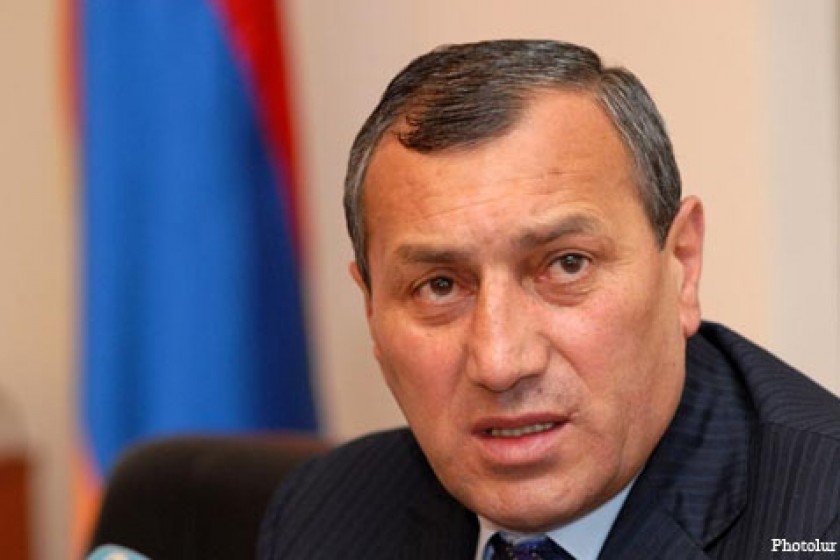Re: Menk mer tzerov badouhanitz ners yenk hraviroum tshnamin.
Նախախորհրդարան. «Վարչախմբի ապազգային և հանցավոր վարքագիծը վերաճում է հայրենադավության»
6 փետրվարի, 2013
Հայ ժողովրդի իշխանությունը յուրացրած կառավարող վարչախմբի ապազգային և հանցավոր վարքագիծը վերաճում է հայրենադավության:
Ազգային շահերի հաշվին անձնական և կլանային շահերի բավարարման նպատակով երկրի գաղութացման, նրա բնական ռեսուրսների ու մարդկային ներուժի գիշատչական քայքայման ու ու սպառման քաղաքականությունն իր տրամաբանական արտացոլումն է գտնում նաև արտաքին քաղաքականության ոլորտում:
Օտար ուժերին Հայրենիքը մաս-մաս հանձնելու միջոցով ներքին լեգիտիմության օրեցօր նվազող բացը լրացնելու քաղաքականությունը հետզհետե արտահայտվում է ավելի ու ավելի վտանգավոր ձևերով: Երկրի ռազմավարական օբյեկտներն ու հիմնական միջոցները օտար կապիտալին հանձնելու և Հայաստանը հանքահումքային կցորդի վերածելու, օտարալեզու դպրոցներ հիմնելու, հայ-թուրքական արձանագրություններ ստորագրելու, Արցախի հարցում պարտվողական դիրքորոշում որդեգրելու քայլերին հաջորդեց Սյունիքի արոտավայրերը իրանցիներին վարձակալության հանձնելու գործարքը: Ներկայացված շղթայի մեջ սրան հաջորդող տրամաբանական քայլը պետության ինքնիշխանության կամավոր զիջումն է:
Այս գործարքի վերաբերյալ ամեն մի ողջամիտ հայ մարդու առաջնային մտահոգության առարկան Հայրենիքից վերջնականապես զրկվելու վտանգն է: Հողերի էրոզիայի և անապատացման, անասնաճարակների և մարդու առողջությանը սպառնացող վտանգների, տեղի հայ բնակչության ապրուստի միջոցների նվազեցման հեռանկարը կամ դիտարկվող գործարքի ակնհայտ ապօրինի առումները նույնպես մտահոգիչ են, սակայն տվյալ պարագայում երկրորդական են դառնում:
Ազգուրաց վարչախումբն ու նրա պարագլուխը չարաչար սխալվում են, եթե կարծում են, որ ամբողջովին բթացրել են մեր ժողովրդի ինքնապաշտպանական բնազդը և նրան զրկել են Հայրենիքին սպառնացող վտանգը զգալու ունակությունից: Պատմությունը ցույց է տվել, որ նման պարագաներում հայությունը համախմբվում է և հակահարված է տալիս:
Նախախորհրդարանը վարչախմբից պահանջում է դադարեցնել հայրենադավության այս գործարքը, իսկ ժողովրդին կոչ է անում զգոն և հետևողական լինել Հայրենիքը օտարին հանձնելու գործընթացը խափանելու գործում:
Նախախորհրդարան
Նախախորհրդարան. «Վարչախմբի ապազգային և հանցավոր վարքագիծը վերաճում է հայրենադավության»
6 փետրվարի, 2013
Հայ ժողովրդի իշխանությունը յուրացրած կառավարող վարչախմբի ապազգային և հանցավոր վարքագիծը վերաճում է հայրենադավության:
Ազգային շահերի հաշվին անձնական և կլանային շահերի բավարարման նպատակով երկրի գաղութացման, նրա բնական ռեսուրսների ու մարդկային ներուժի գիշատչական քայքայման ու ու սպառման քաղաքականությունն իր տրամաբանական արտացոլումն է գտնում նաև արտաքին քաղաքականության ոլորտում:
Օտար ուժերին Հայրենիքը մաս-մաս հանձնելու միջոցով ներքին լեգիտիմության օրեցօր նվազող բացը լրացնելու քաղաքականությունը հետզհետե արտահայտվում է ավելի ու ավելի վտանգավոր ձևերով: Երկրի ռազմավարական օբյեկտներն ու հիմնական միջոցները օտար կապիտալին հանձնելու և Հայաստանը հանքահումքային կցորդի վերածելու, օտարալեզու դպրոցներ հիմնելու, հայ-թուրքական արձանագրություններ ստորագրելու, Արցախի հարցում պարտվողական դիրքորոշում որդեգրելու քայլերին հաջորդեց Սյունիքի արոտավայրերը իրանցիներին վարձակալության հանձնելու գործարքը: Ներկայացված շղթայի մեջ սրան հաջորդող տրամաբանական քայլը պետության ինքնիշխանության կամավոր զիջումն է:
Այս գործարքի վերաբերյալ ամեն մի ողջամիտ հայ մարդու առաջնային մտահոգության առարկան Հայրենիքից վերջնականապես զրկվելու վտանգն է: Հողերի էրոզիայի և անապատացման, անասնաճարակների և մարդու առողջությանը սպառնացող վտանգների, տեղի հայ բնակչության ապրուստի միջոցների նվազեցման հեռանկարը կամ դիտարկվող գործարքի ակնհայտ ապօրինի առումները նույնպես մտահոգիչ են, սակայն տվյալ պարագայում երկրորդական են դառնում:
Ազգուրաց վարչախումբն ու նրա պարագլուխը չարաչար սխալվում են, եթե կարծում են, որ ամբողջովին բթացրել են մեր ժողովրդի ինքնապաշտպանական բնազդը և նրան զրկել են Հայրենիքին սպառնացող վտանգը զգալու ունակությունից: Պատմությունը ցույց է տվել, որ նման պարագաներում հայությունը համախմբվում է և հակահարված է տալիս:
Նախախորհրդարանը վարչախմբից պահանջում է դադարեցնել հայրենադավության այս գործարքը, իսկ ժողովրդին կոչ է անում զգոն և հետևողական լինել Հայրենիքը օտարին հանձնելու գործընթացը խափանելու գործում:
Նախախորհրդարան




Comment